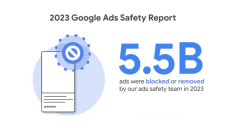Change to Google 'Top Ads' definition seems to favor ads over organic results
Google this week updated its definition of "top ads" in Google Ads Help.
Prior to this change, the "top ads" help page began like this:
Get your ads above Google search results
When people search on Google, text ads can appear above or below the search results. Only up to four ads are eligible to show above the search results.
But the new version active today is this:
Get your ads to show among top ads
When people search on Google, text ads can appear at different positions relative to organic search results. Top ads are adjacent to the top organic search results. Top ads are generally above the top organic results, although top ads may show below the top organic search results on certain queries. Placement of top ads is dynamic and may change based on the user's search.
The practical ramification of this "change in definition" seems to be that some ads appear between the highest-ranked organic results, with a net shift in available space toward ads and away from organic results.
That makes sense from Google's perspective, of course, because Google makes its money - $307 billion dollars in 2023 - by selling advertising.
Google also points out on that page that (1) Top Ads need to have really high Ad Rank, and (2) Top Ads have higher costs per click than run-of-the-mill ads.
Google's suggestions for getting your ads to the top are:
- Improve ad rank by including more information about your business in your ads - like sitelinks and other assets - to improve expected clickthrough rate.
- Focus on relevance of ads and landing pages to what users are searching for.
- Bid high enough to get good ad positions. (They would say that, wouldn't they?)
- Monitor campaign results and make continual improvements.
I would add to that: find those 3+-word queries on which you are most competitive in your market - especially any unique to your business - and let your competitors battle it out for ad position on queries for which you have no hope of getting top ad position.

 - David
- David












Comments on Change to Google 'Top Ads' definition seems to favor ads over organic results